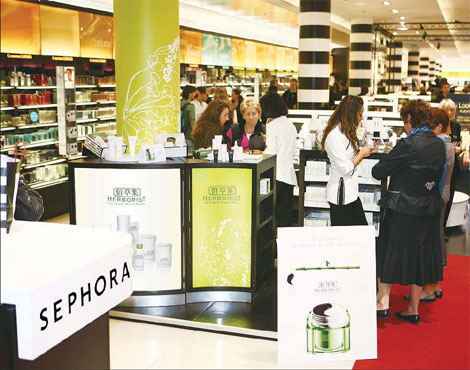Companies
Chinese cosmetics giant builds on french debut
Updated: 2010-12-10 14:27
By Zhou Yan (China Daily European Weekly)
|
 Shanghai Jahwa started to sell its Herborist brand of skincare products in Sephora's Champs-Elysees flagship store in Paris in September 2008. Provided to China Daily
|
When Shanghai Jahwa, China's largest cosmetics producer, set up its first outlet in the global cosmetics hub of Paris in September 2008, many people likened the move to the proverbial folly of "selling coal to Newcastle".
But the "folly" has apparently paid off handsomely for the Chinese company, which has since opened its 120th sales outlet in France this year.
The company has attributed the initial success of its European foray to a number of factors. It has sidestepped potentially prohibitive marketing costs by riding on the Sephora cosmetics chain's extensive sales network in France. Sephora is owned by fashion conglomerate LVMH. What is more, Shanghai Jahwa is selling only one brand - Herborist - of its herbal skincare products in France to avoid possible market confusion.
"Although our sales in France account for only a small portion of our group's total, we managed to break even in less than two years," says Ke Yi, general manager of Herborist International Co Ltd.
Emboldened by its debut in France, Shanghai Jahwa has expanded the sales of Herborist label in other European markets including Italy, Spain, the Netherlands, Turkey and Luxembourg.
"Herborist has received very positive feedback from European clients. Its performance has far exceeded our expectations," Ke says. "We're now planning to set up our first outlet in Rome's international airport to test the duty-free market," he says, adding that the company is also considering opening its French outlets outside Sephora. "We are looking at all possibilities."
Ke declined to disclose his company's European sales, but he says European consumers are becoming increasingly interested in the "magic" of the traditional Chinese herbal remedies for the skin.
Shanghai Jawha is stepping up the promotion of its Herborist brand in various European markets to pave the way for its expansion plan. "We expect to make a profit in two to three years," Ke says.
Back in the Chinese mainland market, the medium-priced Herborist, which was initially launched in 1995, saw more than 60 percent sales growth in 2009. The company plans to add 250 new Herborist stores in China this year.
The Shanghai-listed firm reported 853 million yuan (95.92 million euros) in sales revenue from July to September, up 12.7 percent from the same period of last year. Its net profit also rose by 9.9 percent year-on-year to reach 49.87 million yuan, or 0.38 yuan per share.
Jahwa, which is owned by the Shanghai municipal government, is among one of the few major Chinese cosmetic and personal healthcare product makers that have not been acquired by international companies. L'Oreal acquired Mininurse in 2003 while Johnson & Johnson took over Dabao in 2008.
Ke said the prices of Herborist sold in Europe is "relatively higher" than that in China, which is consistent with a "cultural premium".
Market insiders and analysts say that Herborist's success abroad is mainly attributed to the brand's marketing strategy that emphasizes the Asian culture.
A mask product named Tai Chi Mud under the Herborist brand, for instance, is sold for 380 yuan in the mainland. In Europe, it is priced at 49 euros.
The reasonable prices Jahwa set in the European market helped the company avoid the financial crisis that shattered the cosmetics and personal care sector when consumers tightened their belts to weather the economic winter, analysts say.
E-paper

Ear We Go
China and the world set to embrace the merciful, peaceful year of rabbit
Preview of the coming issue
Carrefour finds the going tough in China
Maid to Order
Specials

Mysteries written in blood
Historical records and Caucasian features of locals suggest link with Roman Empire.

Winning Charm
Coastal Yantai banks on little things that matter to grow

New rules to hit property market
The State Council launched a new round of measures to rein in property prices.
